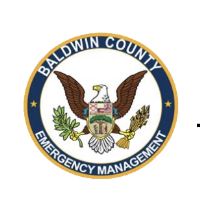Beach Safe
With today being the First Day of Summer, Baldwin County Emergency Management Agency (BCEMA) wants you to BEach Safe and “Know Before You Go!” We all love the beach - the sun, the sand, and the surf. BUT! Just because you are having fun at the beach does NOT mean you can forget about safety.
BE A SAFE SWIMMER
Swimming in the Gulf is much different than swimming in a pool. It is important to respect the strength of the sea and the marine life that lives there.
• ALWAYS check surfing and weather conditions before heading to the beach and observe beach flags.
• Never swim alone. Always stay in groups.
• Don’t swim near piers, pilings, and platforms.
• Do not swim in areas being used by fishermen. Avoid swimming in areas where schools of fish are present. Diving seabirds are good indicators of areas to avoid.
• Alcohol and swimming do not mix.
• Use extra caution when the water is murky. Avoid being in the water during dusk, nighttime, or twilight hours.
PRACTICE SUN SAFETY
• Protect Your Skin Always wear sunscreen appropriate for your skin type, paying special attention to face, nose, ears, shoulders, and feet. Protect your lips as well. Most people don’t realize how much sun they’re getting until it’s too late. Sunscreen should be applied at least 30 minutes prior to sun exposure and should be reapplied every two hours or after getting wet.
• Children Need Extra Protection Liberally apply sunscreen 30 minutes prior to sun exposure. Make sure children wear sun hats and sunglasses. Re-apply sunscreen frequently, especially after swimming.
• Drink Plenty of Water Even if you don’t feel thirsty, your body needs water to keep cool. Avoid drinks with alcohol or caffeine, which can dehydrate you.
• Protect Your Eyes Ultra-violet (UV) rays can damage your eyes. Don’t forget your sunglasses.
• Beware of Heat Stroke Watch for hot, red, and dry skin; changes in consciousness; rapid, weak pulse; and rapid, shallow breathing. If someone shows symptoms, call 911. Keep the victim lying down and cool the body by placing ice packs or cold packs on wrists, ankles, armpits, and neck. Wet towels may also be used. • Sunburn Relief Drink lots of water. Soak in a cool bath or apply cold compresses several times a day. Acetaminophen or Ibuprofen may help relieve pain and swelling, and aloe vera may help relieve the burn. Do not apply petroleum jelly or oil-based lotions.
RIP CURRENTS
Rip currents are the #1 weather-related killer at the beaches along the northern Gulf Coast. Before you hit the beach, learn how to recognize a rip current and how to escape if caught in one.
HOW TO SPOT A RIP CURRENT:
• Rip currents are most prevalent when the waves crash perpendicular to the beach rather than at an angle. • One of the easiest ways to spot a rip current is to look for gaps between the waves. A small patch of calm water surrounded by waves is often a rip current.
• Look for discolored water near the shore. Rip currents tend to drag large amounts of sand and sediment back out to sea with them, so many rip currents are easily identified by a noticeable flow of sand extending away from the shore.
• Rip currents are also common in areas near sand bars, piers, pilings, and jetties.
HOW TO ESCAPE A RIP CURRENT:
• Remain calm. Fighting the rip current can exhaust you.
• Escape the current by swimming parallel to the shoreline. When free of the current, swim at an angle—away from the current—toward shore.
• If unable to escape by swimming, float, or tread water. When the current weakens, swim at an angle away from the current toward the shore.
• If at any time you feel you will be unable to reach shore, draw attention to yourself: face the shore, call, or wave for help.
• To help someone else caught in a rip current, first call 9-1-1 for assistance, then seek help from a lifeguard. If a lifeguard is not present, yell instructions on how to escape or throw the victim something that floats.
BOATING SAFETY
• Always wear your life jacket.
• Your life jacket should fit snug.
• An adult life jacket does not work for a child.
• Use your engine cut-off device.
• Be aware of weather and water conditions.
• Adhere to posted speed zones.
• Watch wake, paddlers may share the waterway.
• Take a boating safety class.
• Know the risks of carbon monoxide poisoning.
• Carry all the required safety gear.
• Boat sober and be considerate of others.
For a daily beach report, text ALBEACHES to 888777



